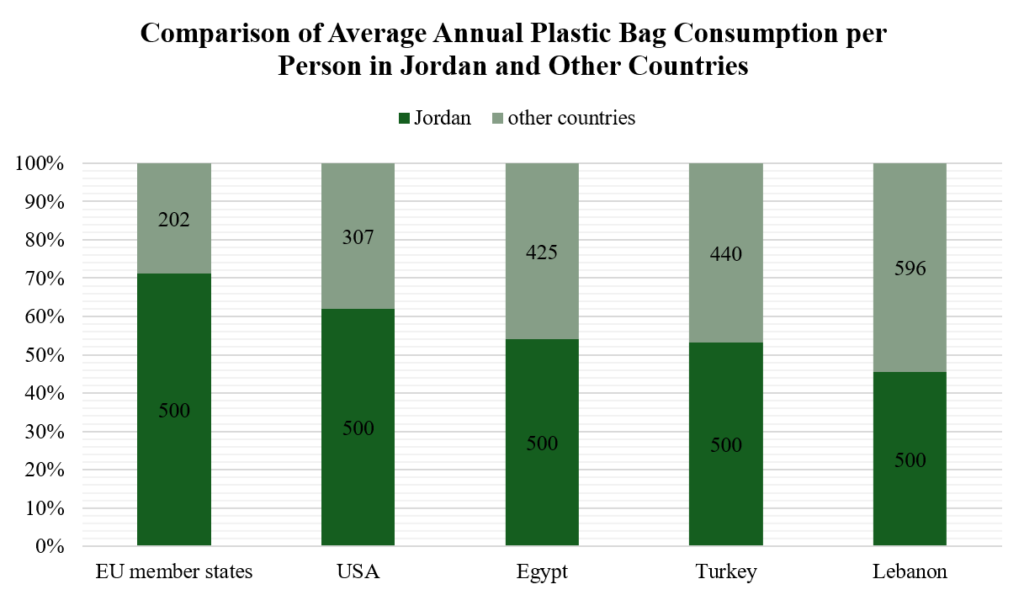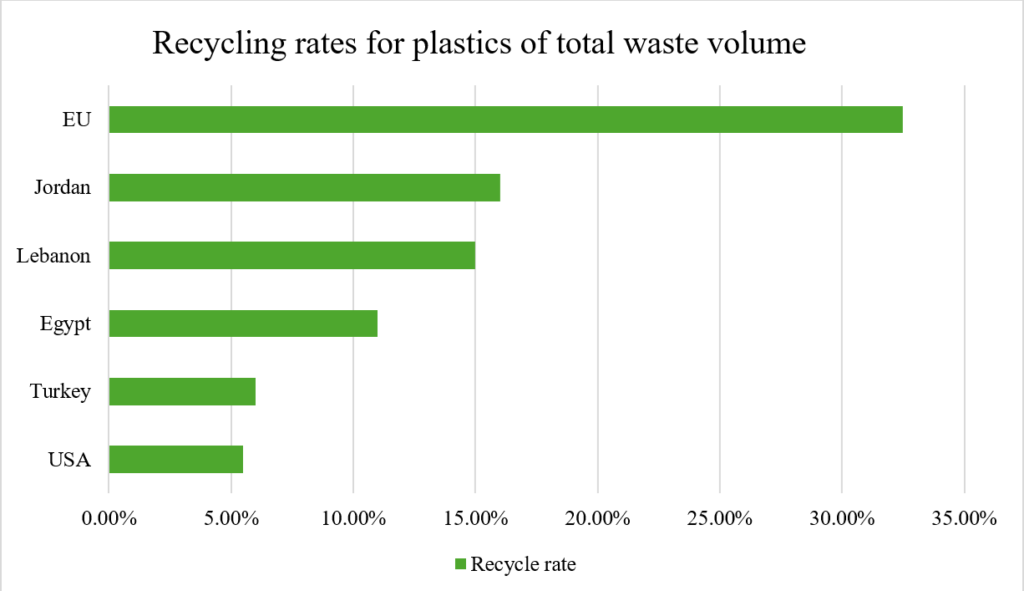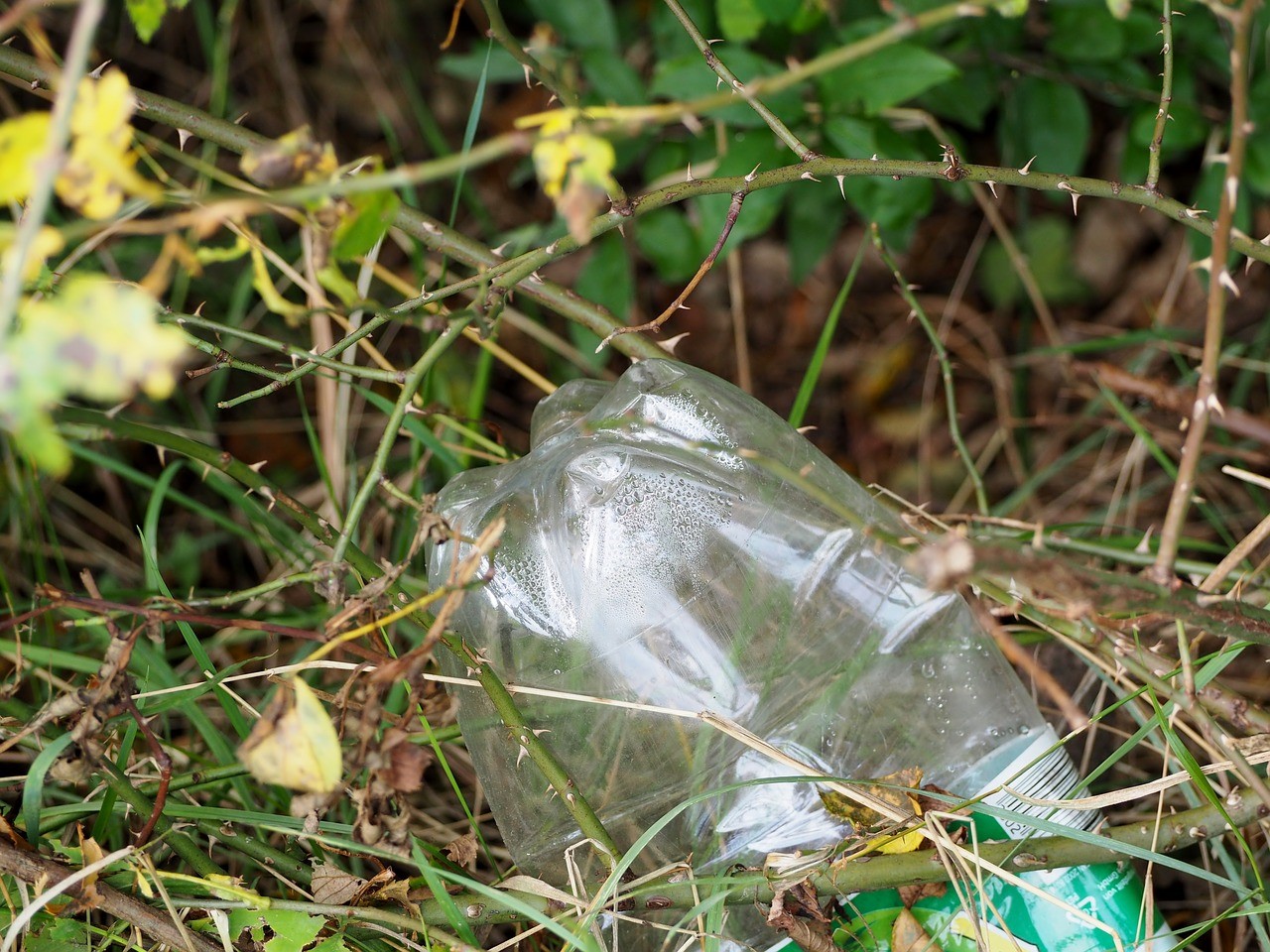Plastic pollution is one of the world’s most pressing environmental issues, and Jordan is no exception. Plastic, with its distinctive properties of durability, flexibility, and low cost, has become an essential component of our daily lives. However, the consequences of excessive plastic use and poor waste management have resulted in severe environmental pollution. Nonetheless, Jordan is recognized as one of the countries actively combating plastic pollution on a global scale. the nation won a direct election to join the Intergovernmental Negotiating Committee to End Plastic Pollution, which seeks to reach an agreement by 2024 (Ammon, 2022).
Plastic Pollution in Jordan: Facts and Figures
In Jordan, the problem of plastic pollution is increasingly noticeable. Studies indicate that plastic waste constitutes a significant portion of the total solid waste produced in the country. On average, each Jordanian citizen consumes 500 plastic bags per year, resulting in approximately 100 million plastic bags discarded into the Jordanian environment each year (The Jordan Times, 2023). Moreover, the average consumption amounts to 1.4 plastic bags per person per day (ACR+). With population growth and urbanization, the consumption of plastic products is increasing, exacerbating the situation. Plastic bags, bottles, and packaging materials are common everyday items made of plastic.
The annual consumption rate of plastic bags by country can be used to infer the average annual consumption per person. Figure 1 shows a comparison of the average annual plastic bag consumption per person in Jordan versus individuals in other countries over a similar time period.

Source: (The Jordan Times, 2023); (SCP/RAC); (Zawia3); (IKV)
Upon examining the data in Figure 1, it is evident that Jordan’s plastic bag consumption per person is significantly high compared to neighboring countries and other major nations. This high rate of consumption indicates a serious risk of environmental pollution if plastic waste is not managed properly.
To understand the annual waste quantities in Jordan, it is worth noting that municipal solid waste amounts to 2.5 million tons per year, while medical waste totals 2,745 tons per year. Effective and sustainable waste management requires accurate measurement and classification, making this process a government priority (moenv (A)). Furthermore, according to the Ministry of Environment, plastic waste makes up 35% of total waste volume. This high proportion emphasizes the critical need for better plastic waste management strategies in order to reduce environmental pollution and promote sustainability.
Jordan recycles 15% of its waste, which can reach 3 million tons per year (Ammon, 2021). However, the recycling rate is quite low. Figure 2 compares recycling volume to that of other countries.
Source: (Alternative Policy Solutions); (HEINRICH-BÖLL-STIFTUNG); (duke); (IPEN); (European Parliament); (Beyond Plastics)
Figure 2 illustrates the recycling rates for plastics as a percentage of the total waste volume in various countries. It is evident that plastic recycling rates vary significantly depending on the country’s capabilities and infrastructure. In Jordan, the recycling rate for plastics is 16%, which is higher than that in Egypt (11%) and Turkey (6%). Jordan’s rate is also close to Lebanon’s, which stands at 15%. Lebanon seeks to address its vast waste problem and the significant challenges it faces. Notably, a major country like the USA has a plastic recycling rate of only 5.5%. In contrast, the European Union (EU) has a much higher rate, recycling 32.5% of its plastic waste, which is nearly double the rate of Jordan. This comparison demonstrates the disparities in recycling practices and the varying levels of effectiveness in managing plastic waste across countries.
Impact on the environment and public health
Accumulated plastic waste threatens the environment, public health, and tourism. According to the Royal Marine Conservation Society of Jordan, plastic waste harms marine life in the Gulf of Aqaba, Jordan’s only seaport. Experts warn of deteriorating marine life and the loss of coral reefs and fish due to the buildup of waste. Additionally, these pollutants threaten diving tourism, as the coral reefs in the Red Sea attract significant attention from tourists (JREDS, 2018). In 2023, approximately 2,500 kilograms of waste were collected from the sea. Additionally, around 2,600 environmental violations related to littering in the sea and on the beaches of Aqaba were recorded that same year (Roya News, 2024). Moreover, it significantly impacts the lives of wild animals. According to the Ministry of Agriculture, 90% of livestock deaths are attributed to the ingestion of plastic waste (moenv, 2024).
More than 430 million tons of plastic are produced annually worldwide, with half of it designed for single-use purposes (Radio Al-Balad, 2023). Plastic, a substance that impacts human health, can release harmful substances when used to store hot food, potentially causing disruptions in hormone levels, such as thyroid disorders. Moreover, using plastic bags and containers to store or transport food increases the risk of birth defects due to the presence of chemicals that react with the food contained within them (Radio Al-Balad, 2023).
Government and civil society efforts
The government is launching national awareness campaigns to reduce the use of plastic bags and promote more sustainable alternatives. It also supports recycling projects and community initiatives to clean up polluted areas. As part of the National Environmental Awareness Plan and the National Waste Management Plan (2022-2026), the Ministry of Environment is working with environmental associations, recycling companies, and civil society organizations to implement a solid waste recycling project, including plastic. This project entails distributing waste sorting containers, raising awareness about proper waste management and recycling, and developing an action plan for collection and sorting mechanisms. Its mission is to raise environmental awareness and encourage a shift toward green economy principles in waste (moenv (B)). The government is working to improve the kingdom’s environmental standards through a variety of projects. For example, the Ministry of Environment inaugurated a plastic waste recycling plant with the goal of converting plastic waste that was previously burned or deposited in landfills into a source of fuel that will fuel the Jordanian economy while also protecting the environment (moenv, 2024).
Looking Ahead: Shaping the Future of Plastic
The statistics and figures clearly highlight the significant challenges Jordan faces in dealing with plastic pollution. However, there is also a noticeable improvement when compared to neighboring countries. It is essential to intensify the collaborative efforts between the government and civil society to raise awareness and improve plastic waste management. This allows Jordan to ensure a more sustainable environmental future while also achieving its sustainable development goals.


